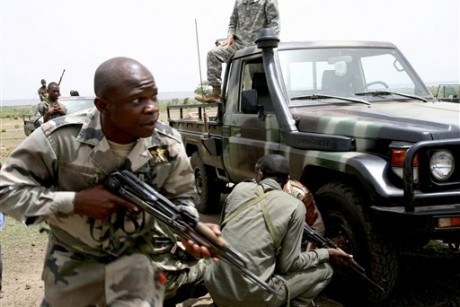The might of the Tuareg militants in Mali's desert has been bolstered by slain Libyan leader Colonel Muammar Gaddafi's weapons. Tuareg militants helped themselves to a considerable quantity of modern weaponry after fighting for Gaddafi. Tuareg militants helped themselves to a considerable quantity of modern weaponry after fighting for Gaddafi.
Gaddafi backed several insurgencies in Africa including Chad and Uganda. And months after his death, at the height of a violent uprising, his weapons continue to fuel unrest.
According to reports, the over 1000 Tuareg militants, commanded by a former colonel in the Libyan army — brought with them enough of an arsenal to match the Malian army.
Emboldened by their new weaponry, they have formed the National Pour la Libération de l'Azawad (MNLA) – a so-called liberation movement.
The rebels have retaken some towns and attacked half-a-dozen more in the north.
"Our goal is to liberate our lands from Malian occupation," Moussa Ag Acharatoumane, one of the rebel spokesmen exiled in France, told Rueters.
A senior official in the Malian Defense Ministry, Lieutenant Colonel Diarran Kone described the weaponry as "significant enough to allow them to achieve their objectives."
"This is a fairly significant military force. The game has changed. They can directly attack the Malian army. I think the army will have trouble," Pierre Boilley, a Tuareg expert at the University of Paris, explained.
Bolstered by Gaddafi's weapons, the group reportedly shelled military installations, announced the "liberation" of the area, raised their rebel flag in the sandy northern towns, as they shouted "Allahu akbar," or "God is great."
Previous insurgencies by the Tuareg militants involved wispy turbaned fighters wielding only Kalashnikov rifles, retreating to the sandy desert mountains under heavy fire from the Mali army.
However, the situation has changed. The Malian army is facing perhaps the most serious threat ever from the Tuareg militants. According to local officials, the rebels, this time, are not fleeing to the rocky mountains of Mali.
"The stability of the entire region could be under threat. All of a sudden we found ourselves face to face with a 1 000 men, heavily armed… heavy weapons.
"Anti-tank weapons, antiaircraft weapons (are being used)," Mali Foreign Minister, Mr. Soumeylou Boubèye Maïga told journalists.
After fighting for Gaddafi, as he struggled to stay in power, the Tuareg militants helped themselves to a considerable quantity of modern weaponry and have returned to Mali, determined to reclaim the desert country.
Bajan Ag Hamatou, a lawmaker from Ménaka, one of the captured towns, blamed the West for having created a mess in his backyard.
"The Westerners didn't want Gaddafi, and they got rid of him, and they created problems for all of us," he said.
"When you chased Gaddafi out in that barbaric fashion, you created 10 more Gaddafis.
"The whole Saharo-Sahelian region has become unlivable," Ag Hamatou was quoted by Reuters.
Gaddafi founded the World Revolutionary Center and his doctrines became the regional matrix of instability in many African nations.
Most of the Tuareg militants had migrated north to Gaddafi's military training camps, after the great regional droughts of the 1970s and 1980s. After receiving training, they fought for Gaddafi in places like Chad.
In death, his ghost is behind the insurgency of the Tuareg militants and the unrest to follow in Mali.



